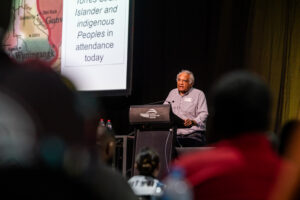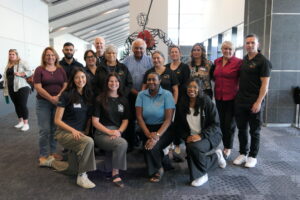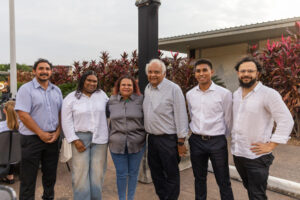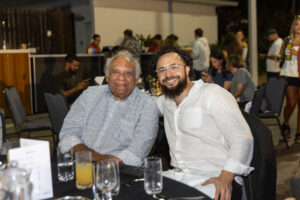 Article
Article
June 27, 2025
Message from the TIS National Coordinator, Prof Tom Calma AO
These past few months have taken me right across the country, from Mapoon to Melbourne, Canberra to Darwin, and every conversation I’ve had reinforces something I’ve always known when we come together, we’re unstoppable. Whether I’m talking with health workers on the ground, community leaders, or the policymakers, the message is clear. We won’t settle for anything less than real change in Aboriginal and Torres Strait Islander health.
Darwin’s 2025 National TIS Workers Workshop was something special. Walking into the Convention Centre, you could feel the energy, the shared purpose, the innovation from every corner of our tobacco control workforce. These are the people doing the hard yards every single day and seeing them come together like that gives me hope. Big thanks to everyone who made the trip and to the NBPU TIS team who keep this work moving.
The recent federal election results offer both continuity and opportunity. I welcome Minister Mark Butler’s return to the Health and Aged Care portfolio that now includes disability. Our department is now called the Department of Health, Disability and Ageing. Minister Butler has shown a willingness to engage meaningfully with Aboriginal and Torres Strait Islander health leaders, and I look forward to continued discussions on how we can deepen our response to the social determinants of health and advance the commitments made under the National Agreement on Closing the Gap.
Back in May, I spoke at the Public Health Association’s conference in Nipaluna. My keynote was called ‘Navigating Government Systems to Drive Meaningful Health Outcomes Beyond Equity’, the message was simple, we’re done with tokenism. We need deep, structural reform and we need it now. The PHAA picked up on this in their coverage, which was good to see. These aren’t new arguments, but they’re as urgent as ever.
My trip to Mapoon really drove this home. Working with Apunipima Cape York Health Council, I saw again what I see everywhere, communities aren’t sitting around waiting for government permission to fix their own problems. They’re already leading the charge. We just need systems that support them instead of getting in their way.
World No Tobacco Day on 31 May reminded me why this work matters so much. From health expos to school visits, our TIS teams were out there making it count. It’s grassroots work like this that shifts the dial, one conversation at a time.
I did an ABC interview recently about reforming Closing the Gap, and I didn’t mince words. We can’t keep fiddling around the edges while people suffer. Accountability has to sit with governments, on all levels, not just communities. We need targets that mean something and systems that show us where we’re making progress and where we’re falling short. The National Agreement targets bias the community controlled sector that is important but I urge the Commonwealth, through the First Ministers forum, sets targets for all tiers of government to address issues like addressing racism and discrimination in their services and organisation, cultural competence and safety and better coordinated efforts with the community controlled sector. This is critical if we are to achieve the overall Closing the Gap targets.
I also co-wrote a piece for Addiction about vaping research. Too often these policy debates happen without any cultural perspective, and that’s a problem when our young people are being targeted. We need to be clear-eyed about the risks and push for real protections.
Reconciliation Week was big again this year with the theme ‘Now More Than Ever’ hit differently after the referendum. I spoke at several events, including a powerful community ceremony here in the ACT. The referendum didn’t go our way, but that doesn’t change the work we do. If anything, it makes it more important and I heavily promote the success of the TIS program that privileges community engagement and voices.
Finally, from the 1st of July TIS will be moving from the First Nations Health Division to Population Health Division of the Department of Health, Disability and Ageing and our funding will now come from the Tobacco Excise Fund.
Here’s what I know after all these years, our people are brilliant, resilient and absolutely capable of leading the change we need. The question isn’t whether we can do it, it’s whether the systems around us will step up and support us properly. I’m not holding my breath, but I’m not giving up either.
We keep showing up. We keep pushing. We keep building the future our mob deserves.
Professor Tom Calma AO
National Coordinator Tackling Indigenous Smoking




